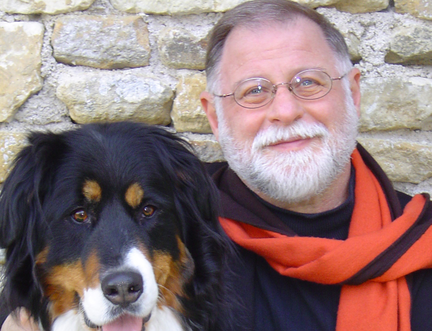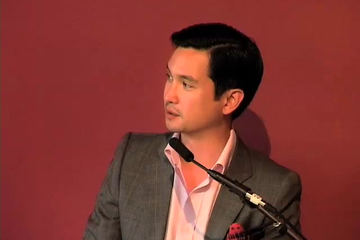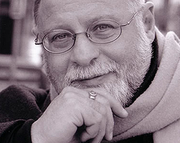A Few Notes on Freedom
By Alberto Manguel

In 2018, we commissioned 51 authors from 25 countries to write essays exploring ideas about freedom for The Freedom Papers, a publication produced in partnership with Gutter Magazine. Read on for Alberto Manguel's essay, and visit guttermag.co.uk to purchase a copy of The Freedom Papers.
As any reader knows, what happens to the characters we follow on the page depends both on the characters themselves and on the circumstances that surround them. Little Red Riding Hood is free to wander in the woods because she has the gumption to disobey mummy, and Ulysses is free to roam the seas because it little profits that an idle king stay at home twiddling his thumbs. What happens next in the story is due to this acted-out freedom: the transvestite wolf and the caesarian rescue, the sailing beyond the sunset and the murderous gulfs. And none of it would come into being without that first step taken outside the boundaries of conventional behaviour. As much as we might suffer (or rejoice) as witnesses to the vicissitudes of the characters we love, we know that however dreadful, however exhilarating, all of that mind-stoking and heart-stirring stuff was created by the imagination of a writer. Personal freedom in books depends on the writer’s whim, and even though Diderot discusses with the reader whether to tell or not tell the loves of his Jacques le Fataliste, and Pirandello has his six characters look for an author to guide them, we know that all this kerfuffle is merely part of a ceremonial game of truth or consequence played between writer and reader that began with the first ‘Once upon a time.’
In life outside books, things are more or less the same, except that there is less of an order and barely any meaning to the stories that extend far back to an invisible moment long before our birth and forwards to the future unconceivable to our ashes, and we are hard put to say where it all began and where it is all going to end. But the sense we have of ourselves exercising that freedom by crossing prescribed barriers, and consequently enduring whatever results from these common acts of daring, is much the same.
Surrounded by the rules and regulations that govern us and that define our social arena, we are more or less conscious of the transgressions, necessary or not, that we perform in order to live our lives. Emotionally, socially, artistically, politically, we try to put into practice what we feel is our inherent freedom to act. In the tension between personal freedom claimed and public freedom allowed, our societies struggle to exist.
In the late 14th century the English term ‘freedom’ meant (according to the O.E.D.) ‘exemption from arbitrary or despotic control, civil liberty.’ By 1570 it had expanded its meaning to include the ‘possession of particular privileges.’ Freedom from abusive action implied now the ability to act in certain free ways oneself. When Shakespeare, in Titus Andronicus, has Bassanius say ‘Romans, fight for freedom in your choice,’ he means fighting for the right to both things.
In our time, John Rawls separates the two aspects of the term in order to distinguish between ‘freedom’ and ‘freedom’s worth’: that is to say, the nominal right to freedom and the right to act according to that freedom. One could apply this reasoning to almost any assumed right to freedom: freedom of speech, freedom of thought, freedom of belief, and then to the acting on those freedoms. Negative freedom (answering the question ‘What is allowed to me?’ followed by the argument ‘because everything should be allowed to me’) is partial at best. It is largely illusory because it doesn’t entail the enablement to act on this freedom. There is a novel by Adolfo Bioy Casares, Plan for Escape, in which a philanthropic-minded governor builds a prison where the walls of the cells are painted in such a way that they offer the prisoners the illusion of freedom. Because of the effect produced by the painted walls, the prisoners imagine they can wander about freely but in fact they are unable to act on that illusion.
The libertines of the Marquis de Sade boast of unconstrained freedom. Obeying neither the laws of nature nor those of society, they demonstrate to unbearable lengths that we humans are capable of anything; only our imagination limits the inventiveness of our crimes. But if everything imaginable can be put into action, however abominable, no action can carry meaning beyond the proof of its feasibility. The tortured and desecrated bodies strewn along the pages of the Marquis’s books, interrupted by disquisitions on the lawlessness and indifference of Nature, signify almost nothing, and are less a proof of the freedom to act than a proof of the lack of a framework for that assumed freedom. That, I think, is what lies behind Plato’s declaration in The Laws, that ‘a limited freedom is far better than an unlimited one.’ An unlimited freedom demands no enablement and in its very lack of constraints consumes itself in its chaos.
But limited freedom is not necessarily restricted to the freedom framed by the rule of societal law: it can also mean the legislation of self-restraint and individual ethics. In his voluminous history of the Holocaust, Martin Gilbert tells the following story:
Among those murdered at Birkenau in June 1944 was the former Elder of the Theresienstadt ghetto, Jacob Edelstein. At 9 o’clock on a Monday morning, Edelstein was in his barracks wrapped in a ritual shawl, saying his morning prayers. Suddenly the door burst open and SS Lieutenant Franz Hoessler called out Edelstein’s name. Edelstein didn’t move. Hoessler shouted: ‘I am waiting, hurry up.’ Edelstein turned round very slowly, faced Hoessler and said quietly: ‘Of the last moments on this earth allotted to me by the Almighty, I am the master, not you.’ Whereupon he turned back to face the wall and finished his prayers. He then folded his prayer shawl unhurriedly, handed it to one of the inmates and said to Hoessler: ‘Now I’m ready.’
This, I believe, is a perfect demonstration of exemplary freedom.
Copyright © 2018, Alberto Manguel. All rights reserved.
Supported by the Scottish Government’s Edinburgh Festivals Expo Fund through Creative Scotland.
- 2026 Festival:
- 15-30 August
Latest News
 Major new partnership with Celtic Connections
Major new partnership with Celtic Connections






